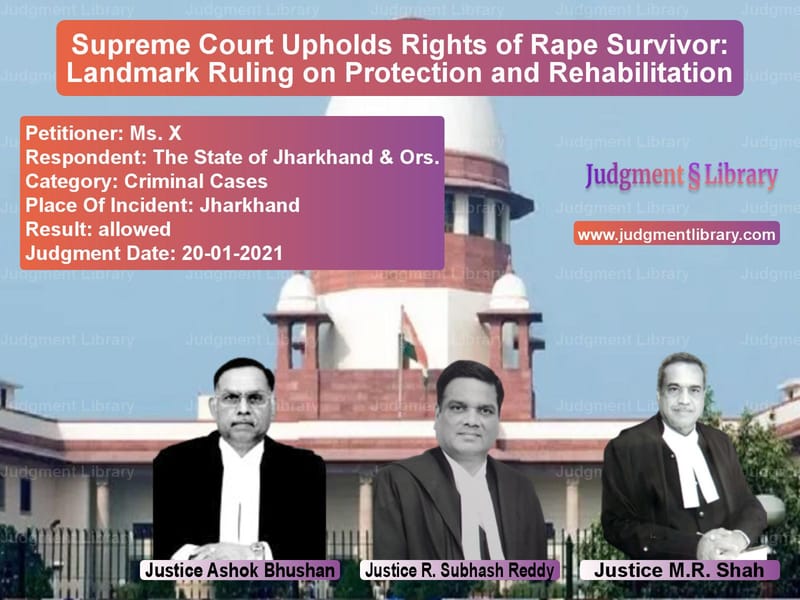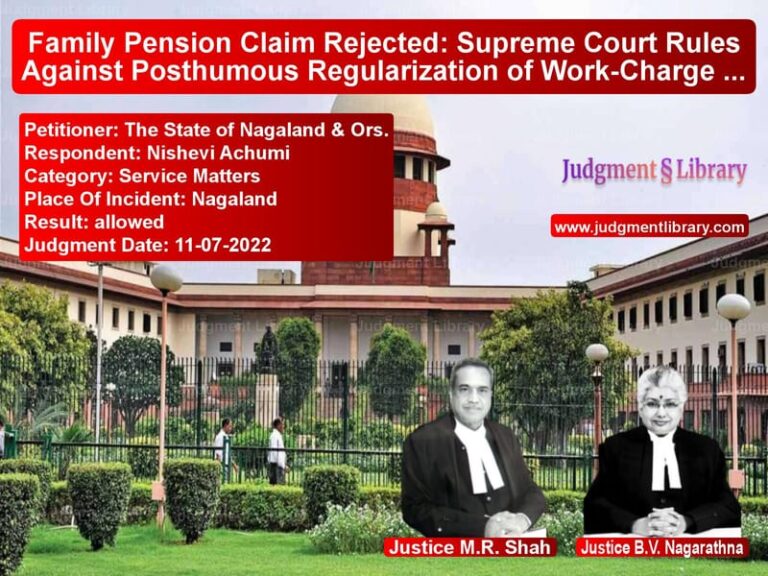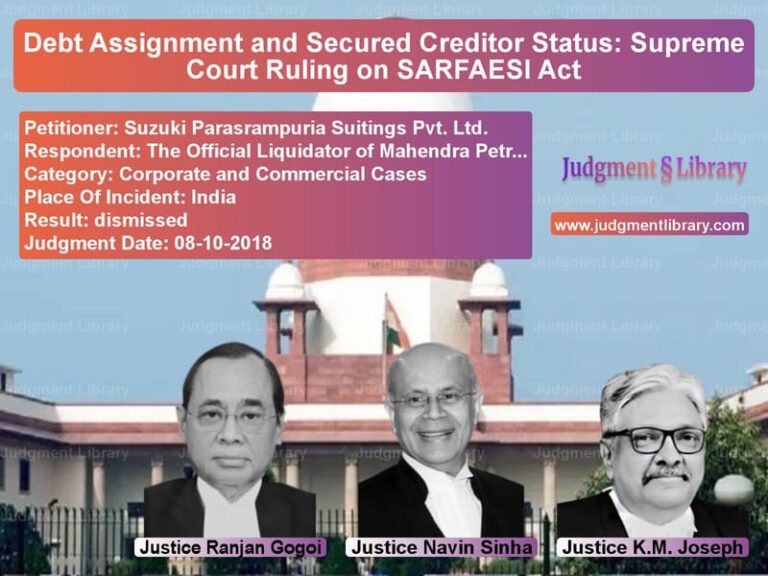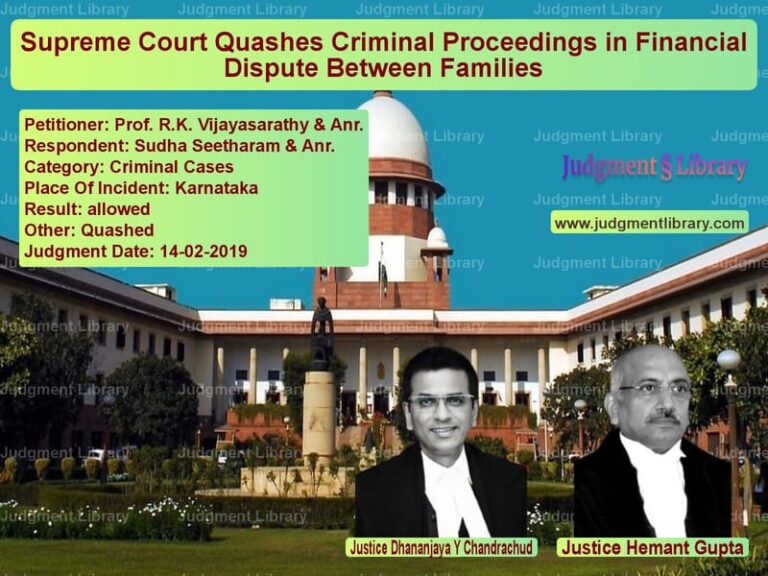Supreme Court Upholds Rights of Rape Survivor: Landmark Ruling on Protection and Rehabilitation
The Supreme Court of India has delivered a significant judgment in the case of Ms. X vs. The State of Jharkhand & Ors., shedding light on the challenges faced by rape survivors, particularly concerning social stigma, rehabilitation, and legal rights. This case, which was filed under Article 32 of the Constitution, raises important questions about the responsibilities of the state towards survivors of sexual violence.
Background of the Case
The petitioner, Ms. X, a Scheduled Tribe woman from Jharkhand, faced multiple incidents of sexual violence over the years. Her ordeal began in 1998 when she was taken away by Basant Yadav, whom she later married under societal pressure. However, their marriage ended in divorce, and her son’s custody was granted to her former husband.
In 2002, while attempting to meet her son, she was subjected to gang rape by four accused, including one Mohd. Ali. A case was registered under Section 376 IPC and the Scheduled Castes and Scheduled Tribes (Prevention of Atrocities) Act, 1989. Subsequently, she also accused high-ranking police officials, including a Deputy Inspector General and an Inspector General, of sexual violence. Her allegations led to multiple criminal trials, some resulting in acquittals while others were pending at the time of the Supreme Court’s intervention.
Key Legal Issues
- Whether the petitioner was entitled to state protection as a rape survivor.
- The obligation of the government to provide housing and financial assistance.
- Whether the disclosure of her identity by the media violated Section 228A of the Indian Penal Code.
- The necessity for free education for her minor children.
Petitioner’s Arguments
The petitioner presented her case before the Supreme Court, highlighting the severe difficulties she faced as a rape survivor:
- She was denied housing because landlords refused to rent to her after her identity as a rape victim became public.
- Her three children were struggling to access education and basic amenities due to a lack of financial support.
- The police had failed to provide adequate security despite threats to her safety.
- The state had not taken sufficient measures for her rehabilitation, leaving her in a desperate situation.
Respondent’s Arguments
The State of Jharkhand, represented by its counsel, contended that:
- Multiple FIRs had been filed by the petitioner, including those alleging rape against various individuals, some of which had led to convictions while others resulted in acquittals.
- The petitioner had a history of moving from one residence to another due to disputes with landlords.
- Security personnel had already been assigned for her protection.
- The petitioner had received financial assistance under the Jharkhand Victim Compensation Scheme, 2012.
Supreme Court’s Observations
The Supreme Court noted that the petitioner had been subjected to an undeniable history of sexual violence. The judgment highlighted:
“There can be no denial that the petitioner is a rape victim. Even if we do not take into consideration other criminal cases filed by the petitioner under Section 376 IPC, in Case No.162/2002 where an allegation of rape was made on 08.06.2002, the accused, Mohd. Ali, has been convicted under Section 376(2)(g) IPC for 10 years RI.”
It further noted that a rape survivor suffers not just physical and mental trauma but also societal discrimination. Quoting from Nipun Saxena & Anr. vs. Union of India & Ors., the Court reiterated:
“A victim of rape will face hostile discrimination and social ostracisation in society. Such victim will find it difficult to get a job, will find it difficult to get married and will also find it difficult to get integrated into society like a normal human being.”
Final Judgment and Directions
The Supreme Court issued several crucial directions to ensure the petitioner’s rights were protected:
- The Deputy Commissioner, Ranchi, was instructed to ensure that her minor children receive free education in a government institution.
- The Deputy Commissioner was also directed to consider her case for housing under the Pradhan Mantri Awas Yojana or any other suitable scheme.
- The Senior Superintendent of Police, Ranchi, was ordered to periodically review the security provided to the petitioner.
- The District Legal Services Authority, Ranchi, was directed to provide legal assistance to the petitioner as necessary.
Regarding the unauthorized disclosure of her identity by the media, the Court reiterated the applicability of Section 228A of the IPC, which criminalizes the publication of the name or identifying details of a rape victim.
Impact of the Judgment
The ruling is significant for several reasons:
- It reaffirms the judiciary’s commitment to upholding the rights of sexual violence survivors.
- It emphasizes the need for state authorities to take proactive steps for rehabilitation and protection.
- It sends a clear message to the media about the consequences of revealing a rape survivor’s identity.
- It sets a precedent for future cases involving the rehabilitation of victims of sexual violence.
The Supreme Court’s decision provides a ray of hope for survivors facing similar struggles, ensuring that justice extends beyond the conviction of perpetrators to the rehabilitation of victims.
Petitioner Name: Ms. X.Respondent Name: The State of Jharkhand & Ors..Judgment By: Justice Ashok Bhushan, Justice R. Subhash Reddy, Justice M.R. Shah.Place Of Incident: Jharkhand.Judgment Date: 20-01-2021.
Don’t miss out on the full details! Download the complete judgment in PDF format below and gain valuable insights instantly!
Download Judgment: ms.-x-vs-the-state-of-jharkha-supreme-court-of-india-judgment-dated-20-01-2021.pdf
Directly Download Judgment: Directly download this Judgment
See all petitions in SC/ST Act Case
See all petitions in Custodial Deaths and Police Misconduct
See all petitions in Judgment by Ashok Bhushan
See all petitions in Judgment by R. Subhash Reddy
See all petitions in Judgment by Mukeshkumar Rasikbhai Shah
See all petitions in allowed
See all petitions in supreme court of India judgments January 2021
See all petitions in 2021 judgments
See all posts in Criminal Cases Category
See all allowed petitions in Criminal Cases Category
See all Dismissed petitions in Criminal Cases Category
See all partially allowed petitions in Criminal Cases Category







